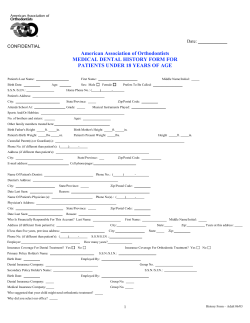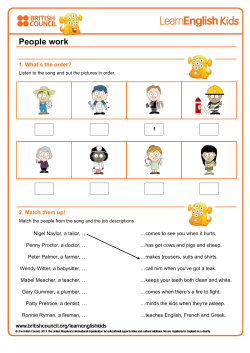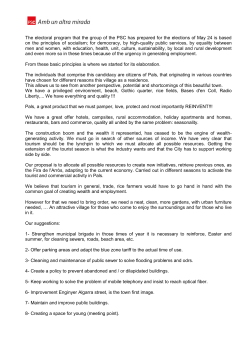
Temporomandibular joint pain dysfunction syndrome (TMJPDS) Information for patients
Ambulatory Care & Local Networks Temporomandibular joint pain dysfunction syndrome (TMJPDS) Information for patients This leaflet explains temporomandibular joint pain dysfunction syndrome (TMJPDS), its causes, symptoms and how it is treated. If you have any further questions, please do not hesitate to ask the clinician looking after you. 3 What is TMJPDS? Temporomandibular joint pain dysfunction syndrome describes a variety of conditions which affect your jaw joint and muscles. It is usually a benign muscular condition so it is not harmful. It is very common and you may have it on one or both sides. Many people may have some symptoms of TMJPDS and in a small number it causes pain. Locating the Temporomandibular Joint Temporomandibular joint Temporal bone Inside view Disk Temporal bone Mandible Mandible What causes TMJPDS ? TMJPDS is caused by many things acting together. For many years it was thought that it was caused by the way your teeth are lined up and the way that they meet. However, recent research has shown that misalignment of your jaw and teeth is not a major cause. Most of the discomfort comes from overusing your muscles and joints. There are many ways this can happen: • Clenching your teeth together. You may do this when you are worried, stressed or depressed by some aspect of your life, such as relationship, financial, exam or illness worries. 2 • Grinding your teeth together. You can do this during the day or at night. • Habits such as chewing pencils, biting your nails, holding things in your mouth and holding the telephone between your neck and shoulder. • Overworking your jaw muscles by constant chewing, such as habitually chewing gum. Will it get worse? TMJPDS is a totally benign condition meaning that it is not harmful and does not cause any long-term damage. The symptoms tend to come and go, often feeling worse when you are anxious. Studies show that it does not get worse as you get older but is actually one of the few conditions which often seems to get better. What problems may I have? • Jaw pain or soreness that may be worse when you wake up or at night. • Jaw pain when biting, chewing or yawning. • Clicking from your jaw joint when you move it. • Stiffness or locking of your jaw joint. • Earache. • Difficulty opening and/or closing your mouth. • Headaches. • Difficulty swallowing. How is TMJPDS treated? There are many simple and effective treatments but no single cure. Studies have shown that up to 90% of patients of all patients will get better with some self care, exercises and using a customised hard bite guard to reduce the tension in their jaw muscles. 3 Occasionally, other types of treatment can help, such as adjusting the biting surfaces of your teeth, medication or gentle jaw exercises. It is very rare to need specialist dental care (orthodontics) or jaw joint surgery to correct TMJPDS. What can I do? Treatment is based around self care – the more you help yourself, the more effective your treatment. • Keep your teeth apart. The correct resting position for your jaw is to have your teeth slightly apart and your tongue resting on the floor of your mouth. This allows your jaw and muscles to rest and relax. Your teeth should only touch when you are chewing, swallowing and sometimes speaking. • Avoid opening your mouth really wide. • Avoid habits such as chewing your fingernails and gum. • Avoid straining your neck and back with prolonged poor posture, for example, when you are working at a computer or a desk. • Eat foods that you do not need to chew hard or for a long time. • Do wear the hard biteguard if your dentist gives you one. • Try to reduce the sources of stress in your life if possible and do more general physical exercise if you can. Please be patient – 9 out of 10 patients with TMJPDS get better by following these simple suggestions. 4 Sharing your information We have teamed up with Guy’s and St Thomas’ Hospitals in a partnership known as King’s Health Partners Academic Health Sciences Centre. We are working together to give our patients the best possible care, so you might find we invite you for appointments at Guy’s or St Thomas’. To make sure everyone you meet always has the most up-todate information about your health, we may share information about you between the hospitals. Care provided by students We provide clinical training where our students get practical experience by treating patients. Please tell your doctor or nurse if you do not want students to be involved in your care. Your treatment will not be affected by your decision. PALS The Patient Advice and Liaison Service (PALS) is a service that offers support, information and assistance to patients, relatives and visitors. They can also provide help and advice if you have a concern or complaint that staff have not been able to resolve for you. The PALS office is located on the ground floor of the Hambleden Wing, near the main entrance on Bessemer Road - staff will be happy to direct you. Tel: 020 3299 3601 Fax: 020 3299 3626 Email: kch-tr.PALS@nhs.net You can also contact us by using our online form at www.kch.nhs.uk/contact/pals If you would like the information in this leaflet in a different language or format, please contact PALS on 020 3299 1844. 5 www.kch.nhs.uk PL535.3 April 2014 Corporate Comms: 0358 Review date April 2017
© Copyright 2025





















